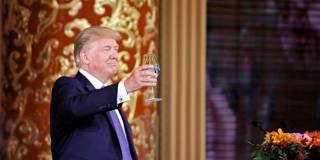While the US presidency has grown stronger over the years, during the Trump administration Congress has been especially timid and subordinate. Will Trump's recent claims to quasi-royal authority change that?
WASHINGTON, DC – US President Donald Trump may not seem to have much in common with North Korean dictator Kim Jong-un, but Trump’s autocratic tendencies are becoming more apparent by the day. Propositions regarding the extent of presidential power that once would have been considered preposterous – both constitutionally and according to longtime practice – are now being discussed as if they were normal ideas.
Kim might find in Trump – the first US president to meet with a North Korean leader (a gift to Kim before talks even begin) – a kindred spirit, at least compared to previous US presidents. But America’s founders would be appalled at what has become of the ideas they enshrined in the US Constitution. Determined not to establish another king, they considered the Congress more significant than the presidency and put it first in the US Constitution, with presidential powers defined in Article II. Trump is taking direct aim at an essential concept: that the president can be held accountable to the citizens.
While the presidency has grown stronger over the years, during the Trump administration Congress has been timid and subordinate. That is because the leaders of the Republican Party – which controls both the House of Representatives and the Senate – are frightened of Trump’s base. They cannot afford to alienate the roughly 30-35% of Americans who passionately back him, ignore his personal transgressions, tolerate his degradation of the country’s civil discourse, favor his brutal treatment of immigrant families, and don’t mind that he is leaving the US almost friendless in the world.

WASHINGTON, DC – US President Donald Trump may not seem to have much in common with North Korean dictator Kim Jong-un, but Trump’s autocratic tendencies are becoming more apparent by the day. Propositions regarding the extent of presidential power that once would have been considered preposterous – both constitutionally and according to longtime practice – are now being discussed as if they were normal ideas.
Kim might find in Trump – the first US president to meet with a North Korean leader (a gift to Kim before talks even begin) – a kindred spirit, at least compared to previous US presidents. But America’s founders would be appalled at what has become of the ideas they enshrined in the US Constitution. Determined not to establish another king, they considered the Congress more significant than the presidency and put it first in the US Constitution, with presidential powers defined in Article II. Trump is taking direct aim at an essential concept: that the president can be held accountable to the citizens.
While the presidency has grown stronger over the years, during the Trump administration Congress has been timid and subordinate. That is because the leaders of the Republican Party – which controls both the House of Representatives and the Senate – are frightened of Trump’s base. They cannot afford to alienate the roughly 30-35% of Americans who passionately back him, ignore his personal transgressions, tolerate his degradation of the country’s civil discourse, favor his brutal treatment of immigrant families, and don’t mind that he is leaving the US almost friendless in the world.